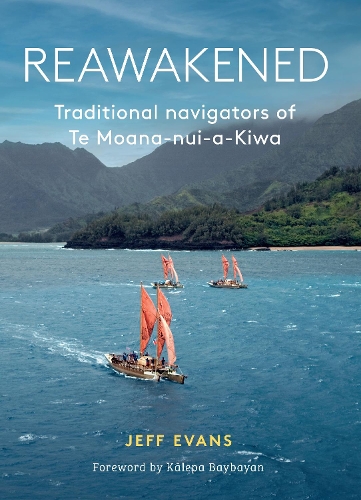Review: Reawakened: Traditional navigators of Te Moana-nui-a-Kiwa
Ten navigators — the late Hec Busby, Piripi Evans and Jacko Thatcher from Aotearoa New Zealand; Peia Patai and Tua Pittman from the Cook Islands; and Kālepa Baybayan, Shorty Bertelmann, Nainoa Thompson, `Onohi Paishon and Bruce Blankenfeld from Hawai`i — share the challenges and triumphs of traditional wayfinding based on the deep knowledge of legendary navigator Mau Piailug.
Reviewed by: Sarah Ell
Author:
When I was at primary school in the 1970s, we were taught about how the Māori people came to settle in New Zealand. First came Kupe, then Toi, then a “great fleet” of seven canoes, which turned up en masse in 1350. What we weren’t told, although (Pākehā) historians such as David Simmons and Keith Sorrenson were already at work debunking this “great New Zealand myth,” was that the whole theory had been cobbled together in the early 20th century, by ethnographer S. Percy Smith.
Generations of Kiwis were raised on a manufactured backstory in which a brave band of explorers came to these shores and killed the original occupants, thus legitimising colonisation as the natural “next step” in a cycle of conquest. The concept of a complex Pacific tradition of voyaging, in which Aotearoa was settled as part of a centuries-old pattern of exploration and settlement guided by the natural world, was buried beneath a whitewash of Eurocentricity which could not comprehend or accept such voyages were possible.
Fortunately, things have changed a lot in the past few decades and the sophistication of Polynesian navigation and voyaging is now widely accepted (and hopefully taught in schools). The revival of interest in traditional voyaging and navigation techniques has gathered momentum since the 1970s and 1980s and now new generations are learning methods of wayfinding and oceanic voyaging which had been overlooked and under-rated for hundreds of years.
Making a significant contribution to celebrating the revival of that knowledge, highlighting its most experienced practitioners and looking forward to the future, is the appropriately named Reawakened subtitled Traditional Navigators of Te Moana-nui-a-Kiwa. Jeff Evans, an Auckland-based writer and photographer, who in 2015 published a biography of one of our greatest waka experts, Hec Busby, brings together here the stories of an elite group initiated as “Pwo” (or master navigators) from across the Pacific. He examines the legacy of the late Mau Piailug, from the tiny atoll of Satawal in the Caroline Islands, north of New Guinea, credited with initiating the waka voyaging revival when he led a crew aboard the Hōkūle‘a from Hawaii to Tahiti in 1976.
The book tells the stories of ten navigators, from Hawai‘i, the Cook Islands and Aotearoa, based on Evans’ research and interviews with each one. Of particular interest to Kiwis will be the chapters on the late Sir Heke-nuku-mai-ngā-iwi Busby, John (Jacko) Webster Te Kapene Thatcher and Philip (Piripi) Leslie Evans, who have each made a significant contribution to the reawakening.
Each chapter reveals the physical and spiritual journeys these men have taken to acquire and express traditional knowledge, and how they are passing this on to new generations. It takes some hard mahi to recover what must once have been an almost innate skill, to learn to find your way based on the movement of the stars, the observation of waves and currents and the behaviour of sea birds and animals. Thatcher talks of the extreme sleep deprivation he experienced on early voyages, as he tried to remain constantly connected to the natural environment and carry the journey in his head, rather than a paper chart of computer screen.
Woven through the narrative is the age-old notion of what today we would call sustainability. Living on small points of land in a vast ocean mean resources need to be respected and cared for, not viewed as something to be exploited. “Care for the canoe . . . care for your resources . . . and care for your people. Then you will have what it takes to survive on the ecosystem you call either a canoe or an island,” Hawaiian Chad Kālepa Baybayan is quoted as saying. In the same vein, Thatcher’s awakening to the understanding of the significance of traditional navigation saw him become a leader in the environmental recovery of the Bay of Plenty following the Rena grounding in 2011. “The ocean is this beautiful place that we ply our trade in and we obviously need to look after it.”
Taking on the role of Pwo goes beyond learning how to pilot a canoe from point A to point B; it encompasses leadership, sustainability, respect for the natural world, being a “beacon of light” for your people. Teuatakiri Tearutua Arthur Pittman, a Pwo of the Cook Islands, says, “Navigation is definitely not just about the voyage; it’s about life.” The stories collected here go beyond tales of epic voyages and incredible feats of navigation — although there are plenty of them — to reveal the deeper, spiritual connection these men feel to the world around them and the traditions of their ancestors. The old ways are reawakening indeed, taking their rightful place alongside the science of Western navigation and encompassing a whole lot more.
Reviewed by: Sarah Ell
